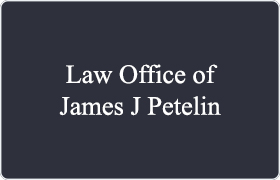LINEUP
A procedure in which the police place a suspect in a line with a group of other people and ask an eyewitness to the crime to identify the person he saw at the c...
(more...)A procedure in which the police place a suspect in a line with a group of other people and ask an eyewitness to the crime to identify the person he saw at the crime scene. The police are supposed to choose similar-looking people to appear with the suspect. If the suspect alone matches the physical description of the perpetrator, evidence of the identification can be attacked at trial. For example, if the robber is described as a Latino male, and the suspect, a Latino male, is placed in a lineup with ten white males, a witness' identification of him as the robber will be challenged by the defense attorney.
 x
x

 James Petelin Chico, CA
James Petelin Chico, CA AboutLaw Office of James J Petelin
AboutLaw Office of James J Petelin Practice AreasExpertise
Practice AreasExpertise
